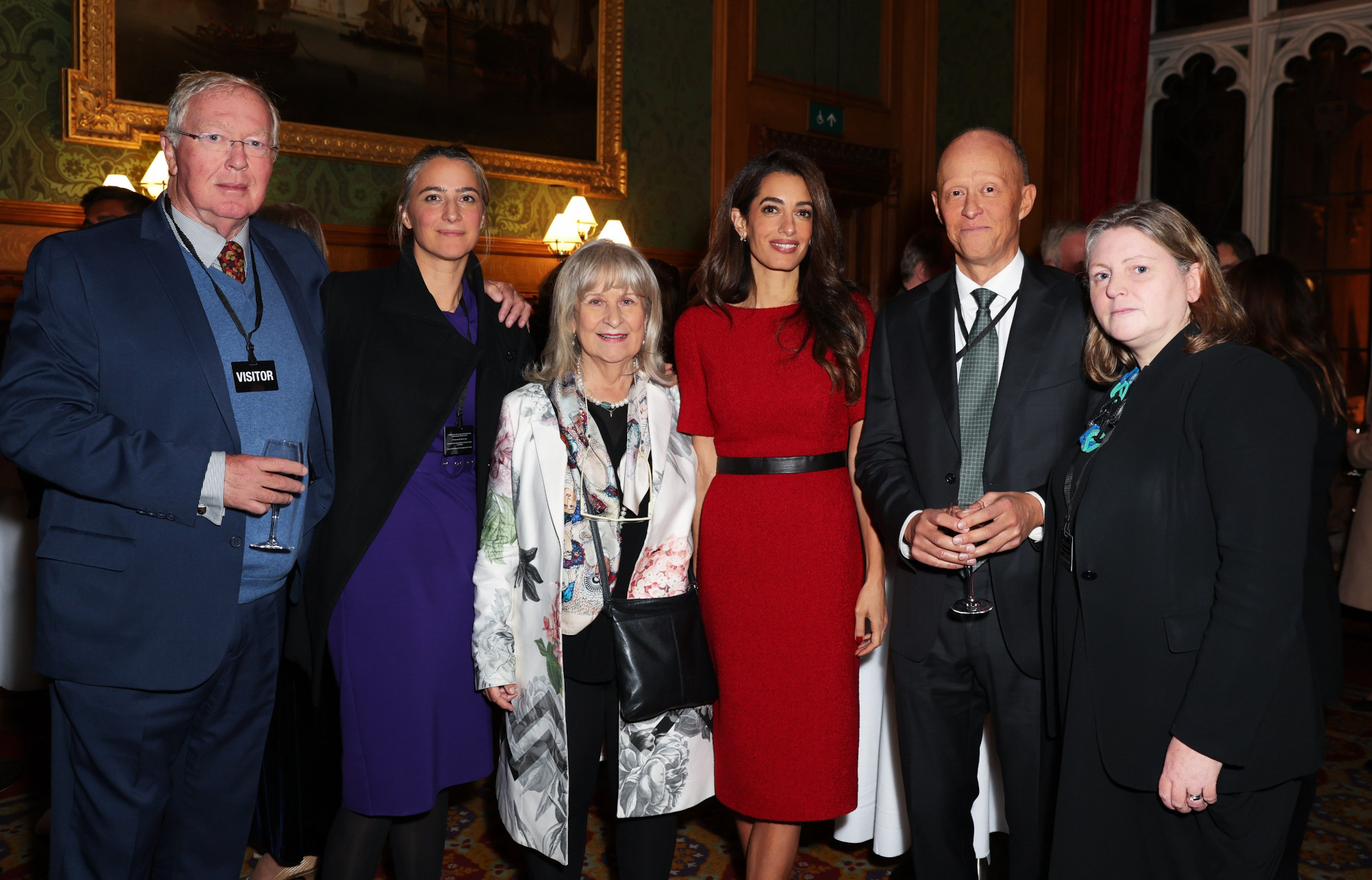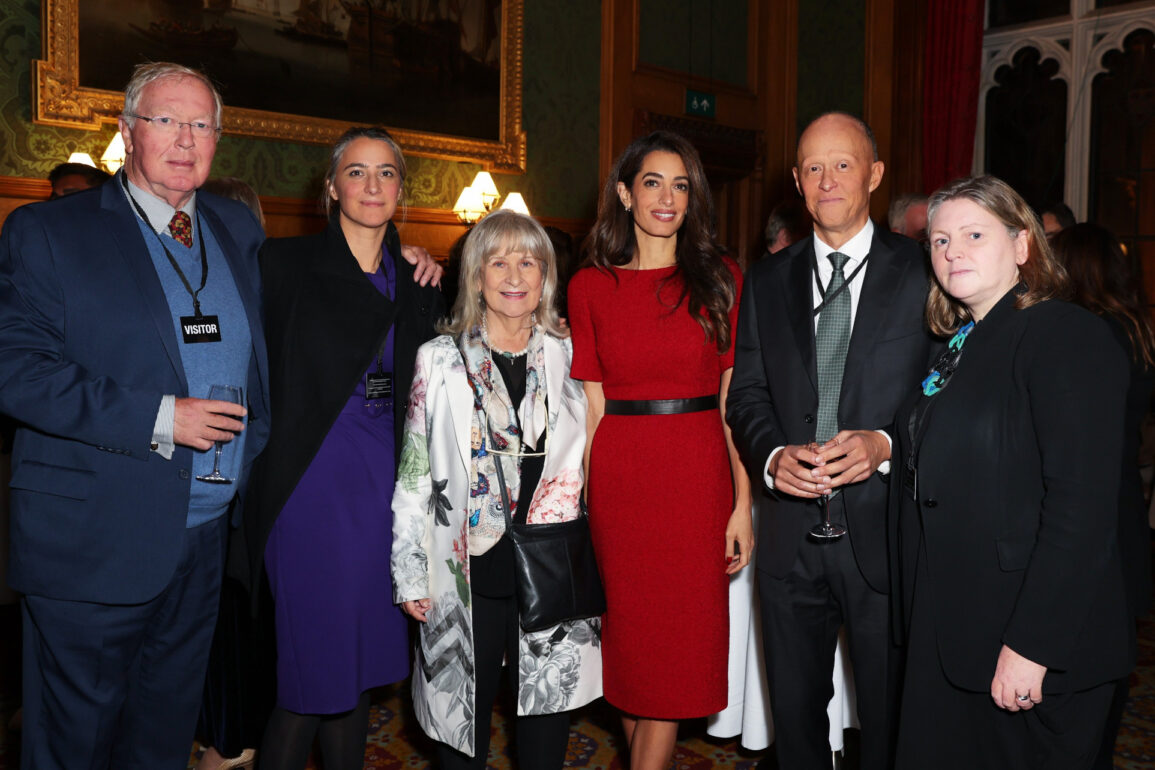
Pictured (L-R): Edward Fitzgerald KC, Dr Tatyana Eatwell, Baroness Helena Kennedy KC, Amal Clooney, Joe Middleton KC and Caoilfhionn Gallagher KC
The UK government has been urged in a new report to reform the law on universal jurisdiction to ensure that war criminals cannot evade justice.
The Global Britain, Global Justice report published by REDRESS and the Clooney Foundation for Justice examines how the UK has faltered in its historical commitment to international justice due to a myriad of legal, practical and political challenges that have stymied prosecutions of international crimes in English courts.
The report sets out reforms that would address these challenges and allow for more successful cases to be brought against suspects of the most serious international crimes – such as war crimes, crimes against humanity and genocide – who come to the UK.
The report was launched by the Clooney Foundation for Justice’s co-president Amal Clooney and REDRESS’ director Rupert Skilbeck during a panel discussion in the House of Lords, moderated by Baroness Helena Kennedy KC.
It highlights that, at present, English law includes only a limited form of universal jurisdiction.
English courts can exercise it over the crimes of torture, hostage-taking, and “grave breaches” of the Geneva Conventions, if the perpetrator is present in the UK. English courts also have jurisdiction over genocide, crimes against humanity and war crimes but only if the perpetrator is present in the UK, and is either a UK national or a legal resident.
This, the report argues, means that non-citizens and non-residents can come to London without fearing prosecution, even if they are reasonably suspected of committing genocide.
Practical challenges have also stymied convictions. Official data shows that between 2013 and 2015, 135 individuals were refused citizenship in the UK by the Home Office due to their alleged involvement in war crimes, crimes against humanity, genocide or torture – yet none of these cases were referred to the Metropolitan Police.
There have only been three successful prosecutions of international crimes in English courts ever, the last more than a decade ago, in contrast to countries such as Germany, France, Belgium and Sweden, whose domestic courts have seen a surge in the number of prosecutions initiated under universal jurisdiction laws in recent years, including of ISIS members, torturers for Assad and Rwandan fighters.
The report also criticises the UK practice of granting “special mission” immunity to foreign officials visiting the UK, without any exclusion for individuals accused of committing international crimes. It mentions the case of Egyptian General Mahmoud Hegazy, allegedly implicated in torture and other human rights violations in Egypt, who was granted immunity on visiting the UK in 2015.
Amal Clooney, co-president of the Clooney Foundation for Justice, said: “UK leaders profess a commitment to justice for war crimes around the world, but when it comes to prosecutions, we are falling short.
“I want to take Ukraine as an example. In the year and half since Russia invaded Ukraine, the UK has repeatedly condemned Putin’s illegal act of aggression. It has frozen more than £18bn in Russian assets, it has sanctioned over a thousand individuals, it has referred the conflict to the International Criminal Court, and it has donated £1m to support the ICC investigation.
“But if a Russian general who has committed crimes against humanity in Ukraine were to show up at Heathrow, we could not arrest him, and we would not put him on trial. He would instead be left to go to Harrods, to medical appointments on Harley street, or do whatever else he wanted to do. My argument today is that this is wrong.”
Rupert Skilbeck, director of REDRESS, added: “The United Kingdom is a country with a commitment to international justice that dates back to the Nuremberg trials, with great expertise in war crimes investigations and prosecutions. But the UK has fallen far behind other countries in Europe when it comes to national trials of those responsible for international crimes.
“Urgent reforms are needed to ensure the criminal justice system is fit for purpose, and that the UK lives up to those expectations.”
This post was originally published on this site be sure to check out more of their content.









